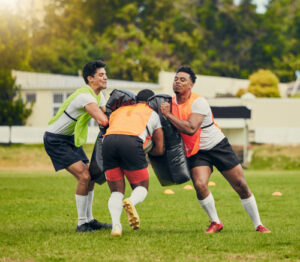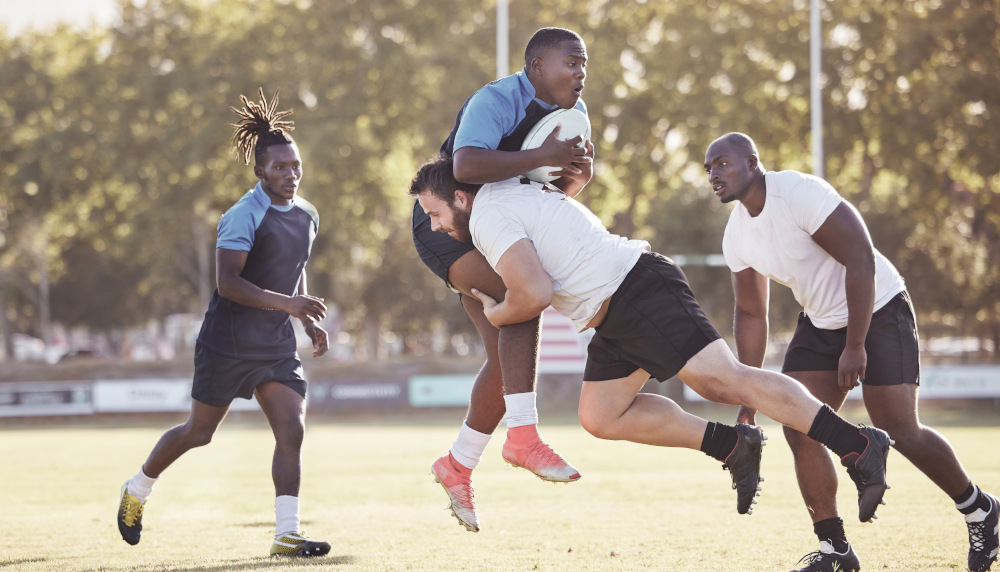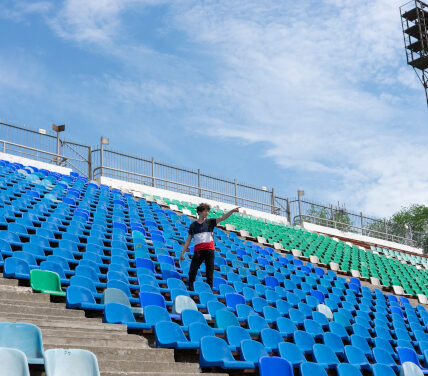There’s a moment some players never forget. Not a try, not a medal, not the roar of the crowd or a raised trophy. Just one tackle. One hit. One collision that rewired something in the body and stitched itself into the brain like a scar under the skin. It’s not always the biggest tackle. Sometimes no one else remembers it at all. But for the player, it stays. Long after the stadium empties and the jerseys fade, that moment plays again and again in their memory, clear and cold and alive.
For Jacques Engelbrecht, it happened in Bloemfontein, on a dusty provincial pitch, late in the second half of a deadlocked Currie Cup clash between Free State and the Sharks. He was twenty-two at the time, still hungry, still fighting for a permanent contract, thrown into the starting loose trio after a last-minute injury. It was the kind of opportunity that came with no promises. Do well, and you might get looked at again. Disappear, and you won’t be back. No one said it out loud, but everyone knew. In those days, Jacques barely slept the night before matches. His kit was packed with more precision than a soldier’s rucksack. His pre-match rituals were obsessive. Two boiled eggs. The same playlist. A prayer in the change room toilet. He had no safety net, no fallback plan. Rugby was the plan. And Bloemfontein was where it would either tighten or fray.
The tackle happened on the halfway line. Not a try-saving hit. Not a dramatic swing in the scoreboard. Just one carry from an experienced Free State number eight, who’d been chewing up metres all game. Jacques met him front on. No shoulder dip, no hesitation. Just clean, solid contact, chest to chest, body to earth, ball dislodged, game paused. The crowd didn’t erupt. The commentators didn’t rewind it. But Jacques felt it all through him. Felt the silence that came after, and the way his teammates clapped him on the back without words. He stood up slowly, not because he was hurt, but because he realised something had shifted. He’d been part of matches before. But now, for the first time, he felt like he belonged in them.
It was a small moment. But it stuck. Not because it made his name, but because it changed how he saw himself. From that day, Jacques stopped waiting for permission to be present. He started speaking more during team meetings. Started trusting his instincts. He didn’t become a superstar, but he became reliable. Coaches noticed. Teammates leaned on him. And long after his contract ended, long after he stepped away from the professional game, that tackle remained. Not framed. Not glorified. Just remembered. The moment the game opened its door a little wider.
In every changing room across KZN, there are similar stories. Quiet, personal shifts that never make it into statistics but reshape entire careers. Siphiwe Mthethwa, a lanky flyhalf from uMlazi, remembers a school final at Kings Park where he chased down a winger no one thought he could catch. It wasn’t even his channel. But he ran, full length, and caught the player just before the line. His side still lost. But the tackle earned him a trial with a development squad. That was four years ago. He’s now coaching U15s at the same school. He says he still dreams about that tackle. Not because it saved anything. But because it showed him something about himself he hadn’t known yet.
 These moments never come announced. They don’t arrive with spotlights or slow-motion replays. They sneak up, buried inside ordinary phases of play. A turnover in midfield. A maul that collapses. A cover tackle from the blindside. And when they land, when they connect in that precise, clean way, they do something permanent. They mark the player. Not with bruises, but with memory.
These moments never come announced. They don’t arrive with spotlights or slow-motion replays. They sneak up, buried inside ordinary phases of play. A turnover in midfield. A maul that collapses. A cover tackle from the blindside. And when they land, when they connect in that precise, clean way, they do something permanent. They mark the player. Not with bruises, but with memory.
In Kokstad, during a wet fixture between two small-town senior clubs, a veteran player in his thirties made a tackle that snapped the rhythm of a much younger opposition. He got up laughing, the kind of laugh that only comes when the body knows it’s done something right, even if the lungs are burning. He didn’t celebrate. Didn’t need to. His team turned around and reset. The game carried on. Afterward, in the change room, someone mentioned the hit. He shrugged it off. But you could tell. It had landed. Maybe not the same way it did when he was twenty-two. But still enough to feel the pulse.
Sometimes, those tackles are the last ones. A shoulder goes. A knee gives out. And that one hit becomes the final imprint. For others, they’re the beginning. A young prop in Durban North still keeps the match ball from his U20 debut, not because he scored, but because in that game, he finally made a tackle that stopped a player who’d run over him in a previous match. It was a personal correction. A moment of balance. He says he keeps the ball not for glory, but for proof. That you can always return. That you can always respond.
The game is full of these moments. They’re not loud. They don’t always win matches. But they build players. They reinforce belief. In a sport where so much depends on form, contract cycles, and public perception, these small, remembered collisions are the anchor. They remind players why they play. They remind them who they are, especially when the world around them forgets.
At the Goldrush Casino lounge in Springfield, where old games play silently in the background and ex-players gather in slow conversation, these stories are told differently. Not with nostalgia, but with accuracy. The exact minute. The opponent. The smell of the turf. The bruise that bloomed the next day. You hear them between rounds on the bingo floor, in the half-smile of a former centre who still runs on instinct when he tells it. It’s not about living in the past. It’s about acknowledging the weight of those moments. How something as fleeting as a single tackle can change everything.
Not every player gets a career. Not every moment leads to a call-up or a contract. But every now and then, the game offers something that lasts longer than results. A moment that digs in. That stays. The tackle that stuck. The contact that said, I was here. I mattered. I made a mark. And in a game that moves fast and forgets even faster, that kind of moment is everything.




